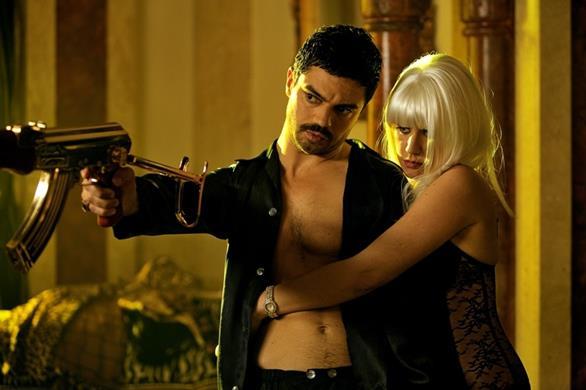 |
| Dominic Cooper, Ludivine Sagnier, The Devil's Double, Lionsgate Films, 2011. |
Duality in all of its intrinsic manifestations is an especially crucial preoccupation of the cinematic art form, as it represents the complexities of man and his world. From the mirror images of Griffith and Lang to the polarization of gender in Minnelli to Aldrich's feminine doppelgangers, the double standards of the reflection offer artists the chance to visualize the two sided nature of man.
Lee Tamahori's career itself can be seen through this conception. His more personal dramas, the piercing debut Once Were Warriors and the masterful, underrated Noir Mulholland Falls counterbalance the terse action of The Edge, Die Another Day, XXX: State of the Union and Next, all expert in their designation of genre and story craft. His strength as a craftsman is cradled by his vision as an artist.
All of this sound and fury prepared him for his newest film, the fascinating but uneven The Devil's Double. This pulpy, over the top pseudo-biopic about Saddam Hussein's psychotic son Uday and his sadistic relationship with his subdued body double, slaps us in the face with its flashy images and buoyantly perverse tale of fascistic power and (homo)erotic passion. De Palma's classic Scarface seems to be the driving influence behind Tamahori's trashy take on the rise and fall of the Iraqi nation and its war with America, the clashing of these split cultures.
As we are regaled with horrifying images, Tamahori's motives become clouded. The razor sharp script can be too black and white at times, before the third act completely collapses. And yet, the biggest delight here, and reason for the film even being of import, is Dominic Cooper's ballsy, ferocious performance as Uday and Latif. It is nothing short of miraculous, declaring the handsome young actor as one of our contemporary greats. His articulation and delineation of these two mirror men as seperate human beings is what great acting is all about, not show offy, but forcefully subtle and possessive. Ludivine Sagnier matches him with a breathtaking spin as Sarrab, the victimized/empowered woman torn between them.
Although Tamahori ultimately comes up short, his film is irrevocably combustive in its cinematic intentions and the successes it does accomplish. The culpability of man in the question of the existence of evil and all of his uncharted facets are called out by the director in a soapy, scummy cluster that's impossible to look away from.
No comments:
Post a Comment